May 8, 2022
My mother often told us: “Wala kayong sariling bait.” (You don’t take care enough of yourselves.) Those words for the most part is why I started my research on the Philippines as an abandoned U.S. territory.
Note: This is not just about the injustice done and continues to be done to the natives of the Philippines. After FDR signed the Tydings–McDuffie Act on March 24, 1934, Winston Churchill warned Washington DC “The national duty, dignity and honour of the United States is at stake.” After 88 years it is obvious that the American people cannot rely on Washington DC politicians, think-tanks and NGOs and must take it upon themselves to redeem their honour and dignity that were lost when FDR, the 73rd and 79th Congresses took away the American nationality of Filipinos in 1934 and again in 1946. Tydings-McDuffie Act in fact, inspired Hitler and the Nazis to pass the Nuremberg Laws on Sept. 15, 1935 that took away the citizenship rights of Jews in Germany. Please see: Waiting For The American Redemption (The 88th Anniversary of the Tydings-McDuffie Act)
I’m sorry to point out that despite all the accomplishments of man to date, this “civilization” still gives priority to violence. Where’s the world’s attention now? The war in Ukraine. Let’s not forget the 94th Oscar Awards night last Sunday March 27, 2022 when Emcee Chris Rock was slapped by Will Smith.

By May 8, 2022 the YouTube post had 98,486,507 views!
Let’s look at some comments by famous celebrities whose attention I’d like to call and focus on the plight of the Philippines, an abandoned U.S. territory. Star Wars legend Mark Hamill described the slap as the “ugliest Oscar moment ever”, and the filmmaker Rob Reiner called for Smith to apologise. Actor Cary Elwes tweeted: “The ‘vessels of love’ I have known or admired never acted violently against another human being.”
For this year’s Mother’s Day, let us remember and honor our mothers who brought us into this world. Let us ASSERT OUR RIGHTS. Let us seek the restoration of the American nationality taken away from our parents and grandparents without due process. Filipinos were U.S. nationals until March 24, 1934 when FDR signed into law the bill passed by the 73rd Congress, the Tydings–McDuffie Act, officially the Philippine Independence Act(Pub.L. 73–127, 48 Stat. 456.Remember action speaks louder than words. Remember this is not just about the Philippines. Most of all, this is about the redemption of American honour, dignity and sense of duty! History will judge us all for what we did and didn’t do.
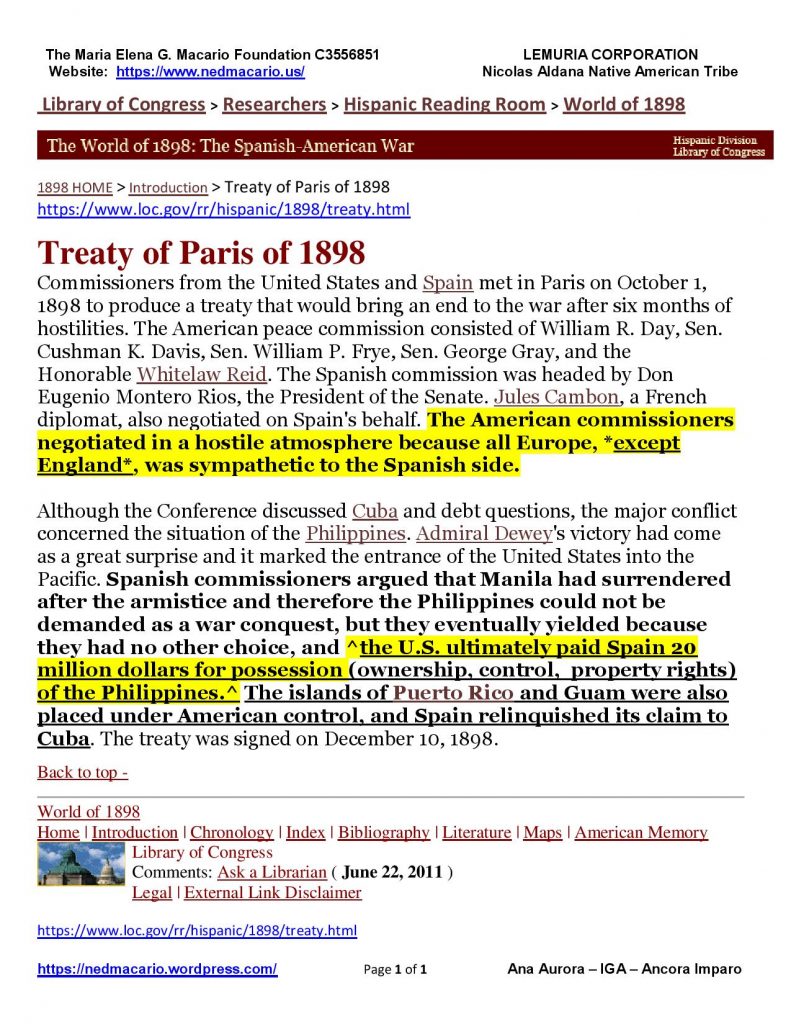
THE LEGAL EFFECT OF THE ACQUISITION OF THE PHILIPPINE ISLANDS University of Pennsylvania, Dept. of Law APRIL 1900
– The Philippines became a part of the U.S. territory by treaty and convention and “the right of our (US) national government thus to extend its bounds has never been, nor can it ever be, called in question by any other nation.” (Pages 193 & 194)
– The only other limitation on the US Government’s action is the will of the American people from whence the government derives its powers as stated in the U.S. Constitution. (Page 194) (Hence the need for a referendum if Filipinos wanted the Philippine Commonwealth Act of 1934; the Rescission Act of 1946 when Filipinos were stripped of their US. Nationality and the Treaty of Manila that granted independence to the Philippines as ratified by the U.S. Senate on 22 Oct. 1946 . – BM)
– The Constitution and the laws of the United States shall be the supreme law of newly acquired territory. (Pages 194 & 195) – Pres. Jefferson sought the amendment of the Constitution to make the Louisiana Purchase possible. Napoleon Bonaparte bought Louisiana from Spain and then sold the same to the U.S. based on this constitutional amendment, Louisiana and other purchases and annexations followed including the acquisition of Florida, what became part of Arizona (Gadsen Treaty) Alaska and the annexation of Hawaii in 1898. (Pages 195, 196 & 197)
– With the right to acquire territories comes the authority to govern. Acquired territories are not entitled to self-governance.
Therefore, they must be under the dominion and jurisdiction of the Union “or it would be without any government at all.” (Page 197)
Here is the last paragraph of the Law Review p.210: “The Legal Effect of the Acquisition of the Philippine Islands – April 1900”
“Let Congress grant citizenship indiscriminately to the white, black, yellow and brown races of the Philippine Islands, and questionably they will then have no power to exclude them from coming to the (U.S.) continent or from the enjoyment of any other constitutional right or privilege, but until such legislation by Congress, the Constitution of the United States extends no greater privileges to the peoples of the Philippine Islands than to the savage tribes of Alaska.
Frank J.R. Mitchell
Below photos of a 1930 American passport (no. 26859) issued to a Filipino with allegiance to the United States.
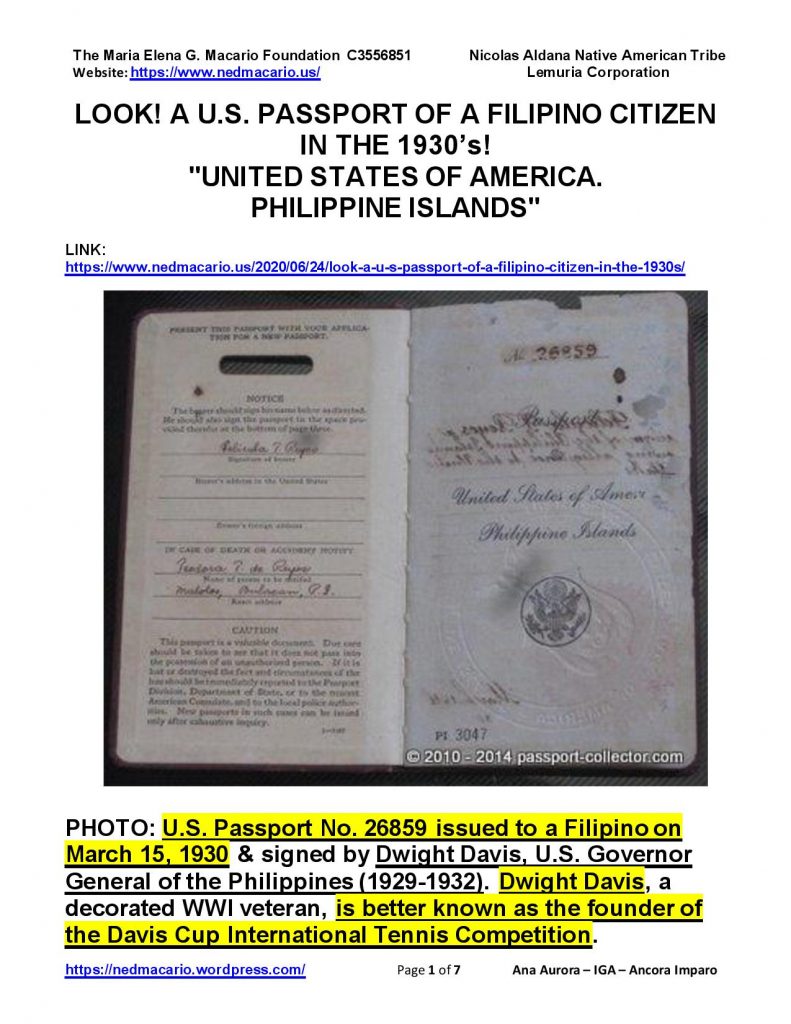
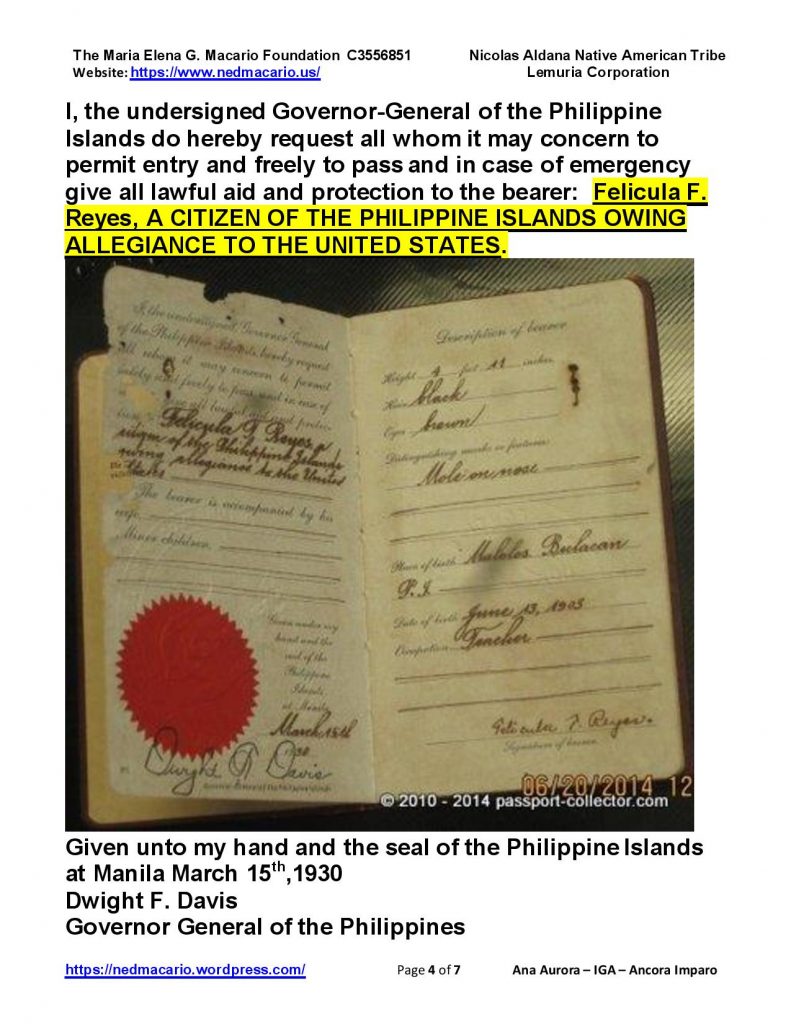
Contemporary American Passport issued to U.S. nationals but not U.S. citizens.
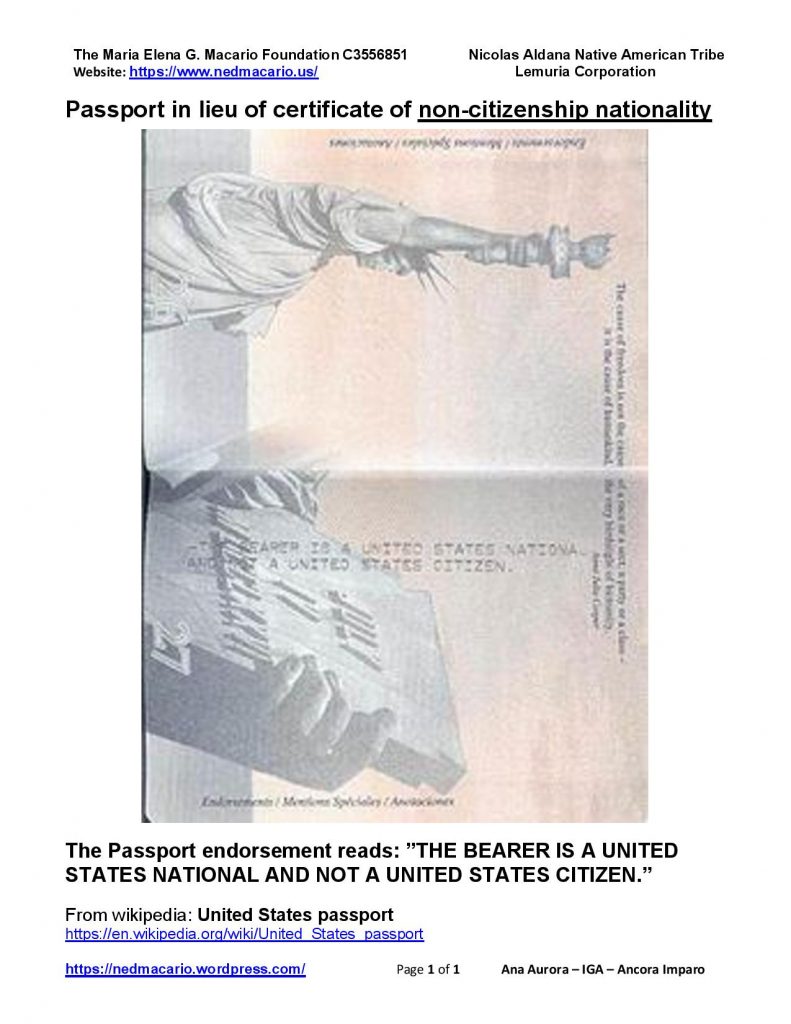
Below: A closeup of the endorsement: “THE BEARER IS A UNITED STATES NATIONAL AND NOT A UNITED STATES CITIZEN.”
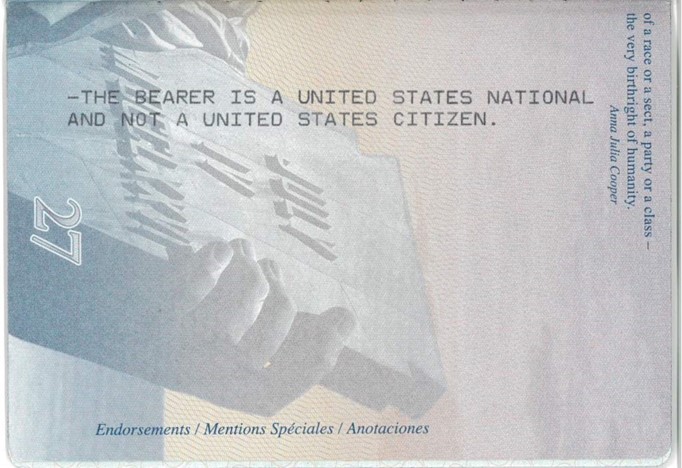
Filipinos should assert their rights and seek parity with Puerto Ricans and those from Guam . And American taxpayers should take back the Philippines, a U.S. territory the principal item, purchased for $20 million under the 1898 Treaty of Paris. Puerto Rico and Guam were additions. Later Spain would sell the rest of its possessions in the Pacific to Kaiser Wilhelm II under the German-Spanish Treaty (1899). But what right did Spain have to sell the Philippines?
The 1898 Treaty of Paris ended the Spanish-American War. For the back story, see: US Acquisition of the Philippines, 1898 (Bienvenido Macario, USA, 05/05/15 4:05 am)
At the start of the Great Depression, the 72nd U.S. Congress first attempted to abandon the Philippines with the passing of the Hare-Hawes-Cutting Act overriding Pres. Hoover veto. However the territorial legislature rejected Hare-Hawes-Cutting Act and it fell to the 73rd Congress and FDR to proceed with the abandonment of the Philippine territory.
After Hitler’s invasion of the Soviet Union on June 22, 1941, the Japanese occupied French-Indo China on July 24, 1941. In response, on July 26, FDR seized all Japanese assets in the United States. On the same day FDR ordered the federalization of Philippine Commonwealth armed forces,@ thus giving back the American nationality of Filipinos when war with Japan was inevitable.
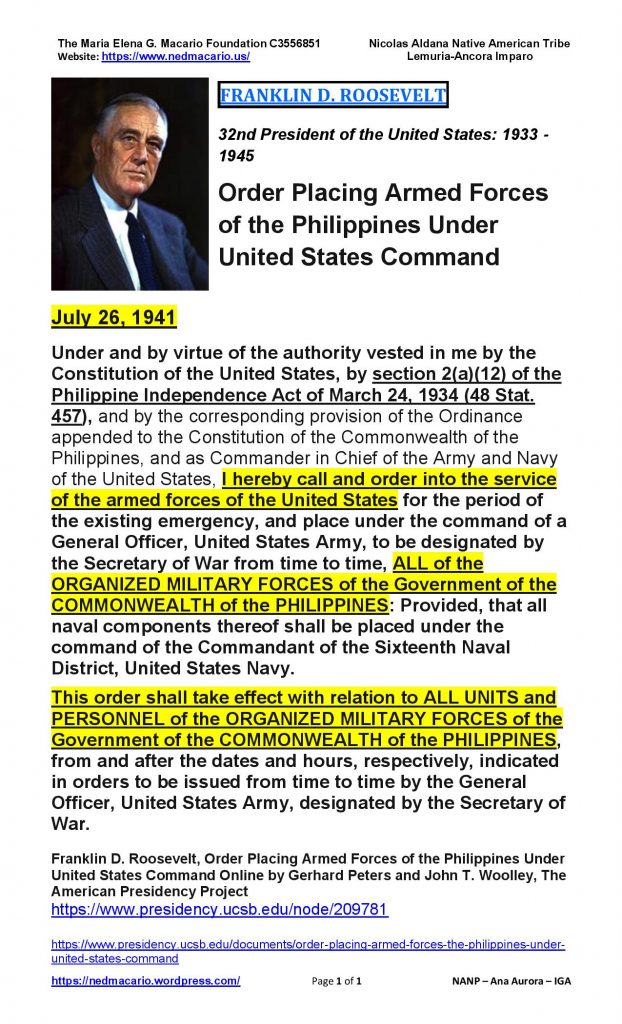
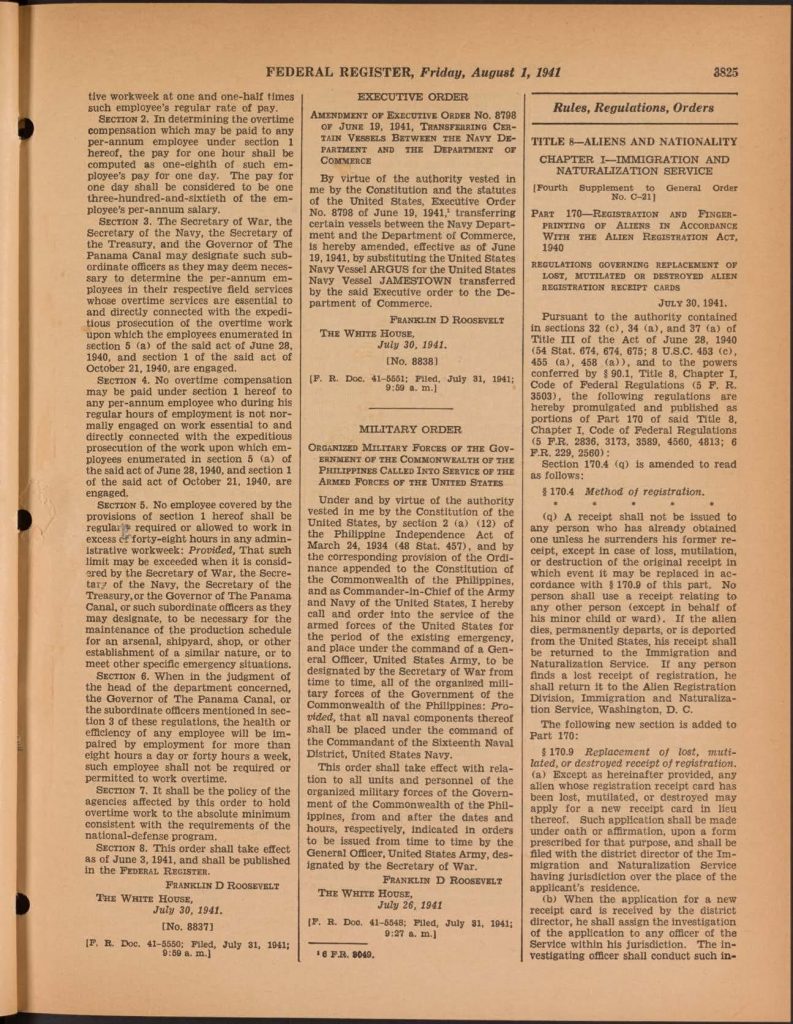
Above: Federal Register, Friday Aug. 1, 1941 page 3825 on the middle column “Military Order”@ Franklin D. Roosevelt’s order placing the Armed Forces of the Philippines under United States Command.
Links:
https://www.govinfo.gov/content/pkg/FR-1941-08-01/pdf/FR-1941-08-01.pdf#page=1
https://www.presidency.ucsb.edu/node/209781
On February 18, 1946, the 79th Congress overrode Pres. Harry S. Truman’s
veto and passed the Rescission
Act of 1946 declaring that the service of Filipino WW2 veterans, the same
soldiers who fought the Japanese and survived the Bataan Death March, as
“not active service” and denying the Filipino veterans the benefits
they were promised when they volunteered to fight for the only country they
knew.
Two (2) days later Pres. Harry S. Truman issued “38 – Statement by the President Concerning Provisions in Bill Affecting Philippine Army Veterans“, saying among others that:
Philippine Army veterans are nationals of the United States and will continue in that status until July 4, 1946.
They fought, as American nationals, under the American flag, and under the direction of our military leaders. They fought with gallantry and courage under most difficult conditions during the recent conflict.
Their officers were commissioned by us. Their official organization, the Army of the Philippine Commonwealth, was taken into the Armed forces of the United States by executive order of the President of the United States on July 26, 1941. That order@ has never been revoked or amended.
I consider it a moral obligation of the United States to look after the welfare of Philippine Army veterans.
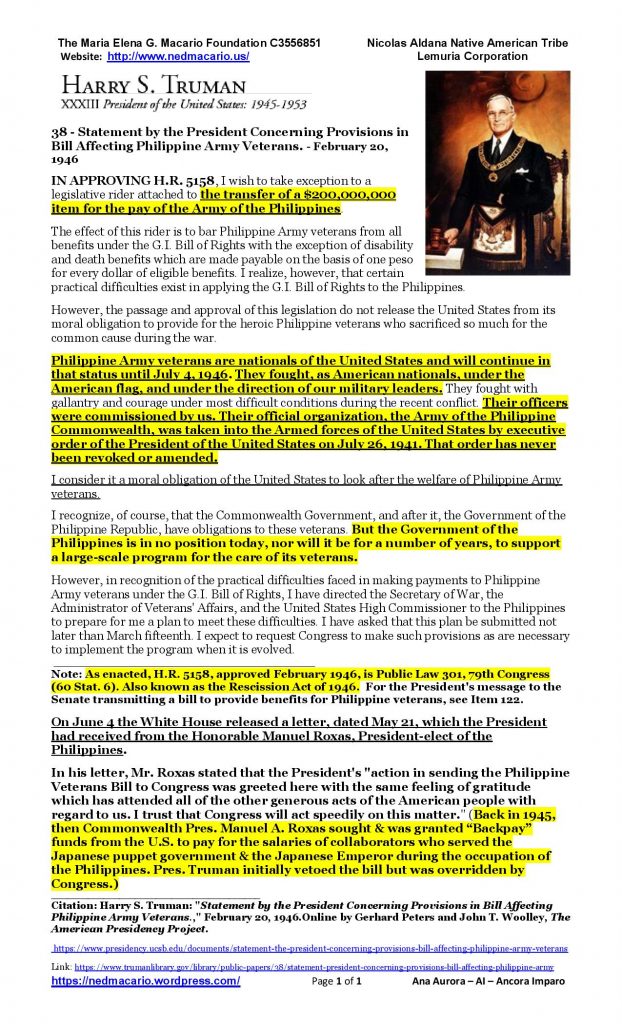
Links:
Best 2022 Mother’s Day advice: “Take it*. It’s yours!”
The Best 2022 Mother’s Day advice: “Take it*. It’s yours!”
* – Repossess the Philippines and issue U.S. passports to qualified Filipinos.
- –
- –
- –
